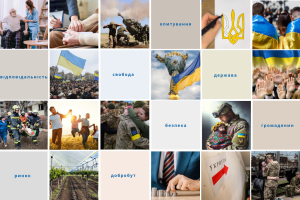The nationwide survey was conducted by the Ilko Kucheriv Democratic Initiatives Foundation jointly with the Center for Political Sociology from August 14 to August 24, 2021. 2001respondents aged over 18 y.o. were interviewed in all regions of Ukraine, except for Crimea and the occupied territories of the Donetsk and Luhansk oblasts/regions, a sample representative of the adult population according to the key socio-demographic indicators. The theoretical sampling error does not exceed 2.2%.
This survey was funded by the government of the United Kingdom as part of the “Evaluation of the impact of the COVID-19 pandemic on stability and peaceful[DB1] ” project. The views expressed in this publication do not reflect the official position of the government of the United Kingdom.
The impact of the COVID-19 pandemic on the healthcare system
Ukrainians remain skeptical towards the healthcare system. 63.5% of respondents believe that the deficit of medicine and medical equipment is the foremost flaw of the health care system. A similar proportion reports the shortage of beds during the peak load of hospitals. The lack of qualified medical professionals and conflicting diagnoses by different doctors are other relevant issues. About 40% of respondents reported corruption in the health care system. The availability of free vaccines against COVID-19 is the only aspect of the healthcare system that does not receive overwhelmingly negative feedback – fewer than 20% reported the issue.
.png)
Importantly, the opinion of the respondents towards the issues of the healthcare system vary depending on one’s type of settlement. For instance, the residents of the capital are less likely to report negative feedback regarding the healthcare system than the residents of other cities and villages.
Only 31% of respondents believe that they will get adequate and quality treatment at a state (communal) hospital in case of a sickness. 28% of respondents do not believe so, and 33% are unsure.
.png)
Almost half of respondents faced difficulty attending to their needs during the pandemic. Secure employment (42.5%) was reported most often. About a third of respondents reported difficulty pursuing leisure activities. A quarter of respondents reported the difficulty of receiving medical treatment.
The COVID-19 pandemic and quarantine restrictions
Almost 14% of respondents reported being diagnosed with the coronavirus and having the test confirm the diagnosis. This figure is notably higher than that of the official data which stands at 7%. It is likely that this discrepancy is due to the various diagnostics methods of the virus other than PCR testing (express tests, CT scan, etc.). At the same time, the overall number of those who report contracting the coronavirus, with or without receiving the diagnosis, is close to that identified by the study of the Center of Public Health.[1] This study found that 40% of the population has the coronavirus antibodies as of June-July 2021.
Washing hands after coming home (54%), keeping distance with others (42%), attending to one’s wellbeing and that of others (49%), and wearing the face mask correctly (36%) are believed to be most efficient means of curbing the spread of the virus. Curiously, 22% of respondents believe that preventive medicine is an effective measure of protection against the COVID-19 pandemic – on par with full vaccination (23%).
.png)
When it comes to the changes the respondents observed in their everyday life due to the pandemic, 48.5% reported wearing a face mask in public places and 32.9% reported using disinfection liquid and wipes. Another 28% reported visiting places of leisure less often to avoid crowds, and 23% reported meeting with relatives and friends less often as well as avoiding physical contact and keeping distance when around others. 18% of respondents reported no changes in their life.
The opinion of the respondents was split when it came to the topic of quarantine restrictions. 23% believe that the quarantine restrictions should be dropped despite the risks of the spread of the COVID-19 pandemic, so that the majority of people can work and earn money. 43% believe otherwise – that it is important to attend to the quarantine restrictions until the risks of the spread of the COVID-19 pandemic are low even if the measures worsen the well-being of most people. Importantly, 34.7% of respondents chose neither of the two options.
The lack of consensus on the quarantine restrictions is confirmed by the fact that the proportion of respondents that is likely to support the local authorities if they decide to drop the quarantine restrictions (40%) is roughly equal to the proportion that would oppose the local authorities in this scenario.
In case the COVID-19 caseload increases at their place of residence, respondents report the need for free testing (46%), the ban on public events (40%), and requirement for those who arrive to Ukraine from countries that have a higher caseload than that of Ukraine to self-isolate for two weeks (38%). Few respondents believe that limitations on the public transportation system (2.6%) should be in place, and 16% of respondents believe that the pandemic does not warrant any of these measures.
Further, the majority of respondents (56.5%) support the limitations on religious services (processions, gatherings) until the COVID-19 pandemic is over. 22.5% of respondents are against the measure.
The perceived efficiency of measures to counter the COVID-19 pandemic
14% of respondents believe that the COVID-19 pandemic in Ukraine is a source of significant danger. Almost half of the respondents believe that that pandemic poses a moderate danger. At the same time, when reflecting on one’s personal rather than one’s interpersonal experience, 23% of respondents are very concerned and 44% are rather concerned. 30% of respondents reported slight concern or the lack of thereof.
Respondents tend to be skeptical of the efforts by the central authorities to counter the COVID-19 pandemic. About a third of respondents believe that the government has been effective and almost half believes that the opposite is true. The rest are undecided.
Local authorities are perceived as more efficient. Only 23% of respondents believe that local authorities are inefficient when it comes to countering the pandemic; 33% approve of the local authorities’ performance in this regard. At the same time, a third of respondents is not aware of the role of the local authorities in countering the pandemic.
Attitude towards vaccination
At the onset of the new wave of COVID-19, the vaccination level in Ukraine is low, as compared to the European countries. The data from the surveys confirms the official data – 18% of the adult population that resides in Ukraine is vaccinated.
Still, the slow growth of the rate of vaccination is likely to slow down even further considering that almost 56% of the adult population does not plan to get vaccinated shortly. Curiously, respondents that have not contracted the coronavirus get vaccinated or plan to do so less often that those who contracted the virus.
This data allows to draw the tentative conclusions with regards to the vaccination issues in Ukraine:
- Few Ukrainians want to get vaccinated. When the survey was conducted, more than a half of Ukrainians reported not planning to get vaccinated shortly. This proportion is significantly higher than it is almost anywhere in the world or among Ukraine’s neighbors that report such data.
%20%D0%A4%D0%911.png)
- The lowest vaccination rate is observed among the elderly who are most vulnerable. The official data reveals that as of September 6, 2021, only 7.6% of those aged 80+ got vaccinated. At the same time, 20% of those aged between 40 and 59 y.o. got vaccinated.
.png)
The responsibility for the poor reach to the oldest Ukrainians regarding vaccination lies with the government.
That is because surveys do not show that this group is particularly unwilling to get vaccinated, as compared to other age groups.
%20%D0%A4%D0%912.png)
When it comes to arguments that persuaded those who got vaccinated or plan to do so shortly, the chief was the need for full-time employment during strict quarantine restrictions. This argument for vaccination was even more popular than the safety and efficiency of the vaccines.
Age groups attend to different arguments. The older the person is, the more likely they are to be unemployed (hence, they do not need to work during the lockdown) – for the elderly the recommendation of the doctor is the most significant argument for vaccination. A significant proportion of the younger respondents reported that the ability to travel abroad is a significant argument.
%D0%A4%D0%913.png)
.png)
Moreover, those aged 55+ tend to have fewer concerns about the vaccination, as compared to the other groups. This group mostly reports not wanting to get vaccinated due to concerns about their health condition.
The reasons why the elderly choose to get vaccinated less often than other groups is the low mobility of these individuals and the lack of capacity of the mobile vaccination brigades, especially in the rural areas.
Thus, to decrease disinformation and increase the vaccination rate, it is advisable for those responsible for the vaccination campaign to communicate the following messages:
For the elderly. The usual arguments that emphasize the vaccine safety and efficiency should be aired by the primary care doctors. For the elderly, the advice of doctors is an important factor. The opportunity to engage the seniors can be used to refute myths about contraindications. In practice, the medical concerns of a person may be the very reason why they should get vaccinated, which may be contrary to their logic.
For the youth. The vaccinated should receive preferential treatment during lockdowns. For example, the right to work is critical for most respondents. When communicating with the youth, the authorities should emphasize the fact that vaccination is mandatory for international travel.
Attitude towards mandatory vaccination
Overall, the respondents do not support mandatory vaccination for the adult population. 23% of respondents are in favor of the measure. More than a half (52%) of respondents are against the measure. At the same time, Ukrainians support mandatory vaccination of the medical personnel (50.1%), education professionals (42%) as well as the military and police personnel (40%).
Respondents that have either contracted the coronavirus or suspect so are more likely than the other groups to support the mandatory vaccination of the adult population (31.2% support the measure; 47.5% are against the measure), of the medical personnel (47% support the measure and 26% are against the measure), and of the military and police personnel (43% support the measure and 33% are against the measure).
.png)
[1] At least 40% of Ukrainians have the SARS-CoV-2 antibodies. The preliminary results of the nationwide study on the spread of the SARS-CoV-2 antibodies. https://www.phc.org.ua/news/schonaymenshe-40-ukrainciv-mayut-antitila-do-sars-cov-2-pershi-rezultati-vseukrainskogo








